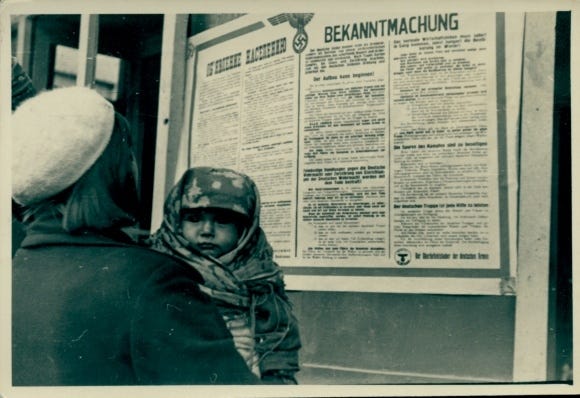
July 23 - July 27, 1942.
Summary:
The same day the soldier students leave Munich, headed for the Russian front, Adam Czerniakow — head of the Judenrat in the Warsaw Ghetto — suicides. Czerniakow had asked Nazi bigwigs if rumors about deportations East were true. They had all emphatically denied those rumors.
The rumors are true. Czerniakow must ensure that 6,000 Jews would be deported to extermination camps daily, else Czerniakow’s wife will be shot. Czerniakow pleads for exemptions for orphans, but his request is denied. He therefore swallows a cyanide capsule. His suicide note reads, “I can no longer bear all this. My act will prove to everyone what is the right thing to do.”
Alexander Schmorell, Hans Scholl, Willi Graf, Hubert Furtwängler, and Raimund Samüller continue their eastward trek. They are struck by the beauty of the German landscape, Regensburg, the Danube, Dresden. They enjoy the sun and scenery, the conversation and games. The friendship.
Hans Hirzel visits Sophie Scholl, primarily to get Christoph Probst’s address in Munich. Sophie tells him how important Kurt Huber is to their circle. She mentions that Huber is a Leibniz specialist and that he had studied mathematics. Sophie also relates to Hans Hirzel that Kurt Huber’s speech impediment was due to an injury from World War I and that because of it, he only taught in small groups.
Hans Hirzel visits Christoph Probst. They discuss religious questions and “intimate” relationships.
Manfred Eickemeyer closes down his studio in Munich, handing the keys over to the building’s janitor, Mr. Mayer. He has not made any arrangements with Hans Scholl for use of the studio in his absence, because he does not know Hans well enough. Mayer has one set of keys, while Eickemeyer takes the other set with him to Cracow.
The five Russia-bound friends cross into Poland. The endless plains cause them to occasionally stop what they’re doing and stare out the window. Hans Scholl notes that all that beauty must make one think about Polish prisoners in Germany and their love of country.
The Scholl family is advised that Robert Scholl’s trial for perfidy will be starting soon. Inge Scholl travels to Munich to meet with Carl Muth and Theodor Haecker to ask them to pray for her father. Their comfort reassures her.
Why this matters:
One golden thread to follow throughout this story, one that hit me hard the first year or so I worked on this history: Even when the world is coming apart at the seams, good and happy parts of life continue. Czerniakow and the Jewish residents of the Warsaw Ghetto were entering a nightmare from which few would emerge alive. Yet on the exact same day that Czerniakow found life too hopeless to continue, Willi Graf notes that the day is so beautiful. All five young men were touched by the beauty of the German countryside.
On a nonpolitical note, when we face our worst days, someone else is getting married, having a baby, celebrating an anniversary, going to a dance, marveling at the colors of a sunset.
On a political-but-not-partisan note, when terrible things happen on a national or global scale, life goes on. “Our side” suffers a setback, someone we admire dies, there’s a grave injustice in our town or state. But someone, somewhere, is getting married, having a baby, celebrating an anniversary, going to a dance, marveling at the colors of a sunset.
Even in the middle of fighting on behalf of social justice, for tikkun olam, to change and repair the world, we must keep living. Keep enjoying the sunshiny day, the colors at dusk, the smiles of our friends.
It may sound corny, but follow this golden thread.The little anecdote about Hans Hirzel visiting Christoph Probst made me appreciate Christoph Probst all the more. He could have blown off Hans Hirzel, who was so insecure as to be annoying. But Christl extended friendship and kindness to the high school boy, a boy who desperately wanted to be a man.
Their short conversation made a profound impression on Hans Hirzel.
White Rose History, Volume II, pages 136-138.
Notes and references available only to paid subscribers.
Listen to this episode with a 7-day free trial
Subscribe to Why This Matters to listen to this post and get 7 days of free access to the full post archives.












